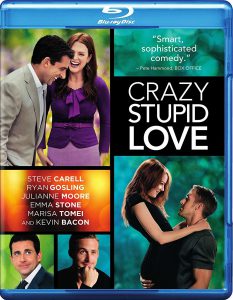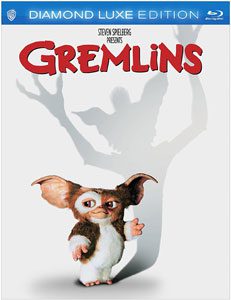I love a lot of scenes, a lot of moments, a lot of lines from “Crazy, Stupid, Love.,” the best movie of 2011 so far. But one line delivery is sticking with me: Robbie (Jonah Bobo), the hopeless romantic 13-year-old, giving a speech at his middle school graduation, starts with “I’ve been in love.” People in the crowd giggle, as they always do in this situation, and Robbie responds matter-of-factly, “I know, it’s funny because I’m 13. But whatever. It’s true.”
Inevitably, any discussion about love (especially if you’re 13) will lead to the question of whether the person is actually in love. There’s no point in ever arguing about this. Just as when someone says they talked to God, there’s no point in telling them they didn’t converse with the Almighty. It’s not something people say unless they believe it. And in the case of both love and religion, if you believe it, it’s true. (Only to you, of course, but since you are you, your truth is the ultimate truth.)
Let’s take a step back to break down the relationships here: Cal (Steve Carell, reminding those of us who grew tired of his Michael Scott shtick that he is a talented, versatile actor) and Emily (Julianne Moore) have been together since they were 15, but in middle age, Cal has become boring and Emily has become bored. She sleeps with a co-worker, David Lindhagen (pronounced “HAH-gen,” and played by Kevin Bacon), and they contemplate getting a divorce.
The immaculately dressed, smooth-with-the-ladies Jacob (Ryan Gosling) takes on Cal as a pet project when he sees the sad sack at his favorite pickup bar. The only thing Jacob doesn’t have a game plan for is being in love, so when he meets Hannah (Emma Stone) — whose character, in a bit of cinematic shorthand, consists primarily of being as adorable as Emma Stone — he admits it’s a “game changer.”
Oh, and Robbie — Cal and Emily’s son, who speaks with his heart on his sleeve in a way not seen since Dawson Leery was on our TV sets every Wednesday — is in love with his 17-year-old babysitter Jessica (Analeigh Tipton). And Jessica has a crush on Cal. And Kate (Marisa Tomei) really wants a second date with Cal. What’s the geometric term here? Love octagon?
Amidst all these distinctly drawn love-struck and lovelorn characters, the greatest accomplishment of “Crazy, Stupid, Love.” is that it serves up the two most common — and completely contradictory — points-of-view on the topic, doesn’t settle on one, yet it feels satisfying anyway. (The two arguments are: One, that everyone has one soul mate that they are meant to be with, and they are worth fighting for; and two, that when you get your heart broken, you should move on.)
Robbie is logically correct when he speaks about the foolishness of believing in a soul mate; yet Cal is spiritually correct when he says soul mates are real. The truth is that some people get to be with the person they love, and some don’t, but that’s just a bland factual statement. In “Crazy, Stupid, Love.,” the mere fact of being in love — whether you are one of the lucky who get to be with your soul mate ones or not — is made out to be a grand, noble feeling.
This is achieved because all of these romantic situations ring beautifully, cutely or awkwardly true. Boy, does “Crazy, Stupid, Love.” stand out against its genre competition. One of the previews at my screening was for “What’s Your Number?,” where Anna Faris just can’t get a guy to marry her, darn it. It’s one of those premises that’s so off base that it makes me downright angry because like any guy, I would marry Anna Faris no questions asked. And it might be a cute movie, but right from the get-go, it falls in the “fluffy romance movie” category.
The “realistic romance” category is much smaller, and probably no two people will agree on what belongs there (it all depends on their personal experiences with the L-word). I think “Crazy, Stupid, Love.” belongs in a select group with “(500) Days of Summer” (“when you get your heart broken, move on”) and “Garden State” (“soul mates are real”). And in a nice change of pace for the subgenre of realistic romances, I could actually see “Crazy, Stupid, Love.” the week it was released, rather than reading about it for months in Entertainment Weekly before it came to my little town, and then only on DVD.
Now, I won’t deny that “Crazy, Stupid, Love.” has decidedly cinematic arcs and moments. There’s the contradiction between the player and the nice guy (this will be explored as a broader comedy next week in “The Change-Up” with Ryan Reynolds and Jason Bateman), there’s the teenage boy who’s a hopeless romantic, the teenage girl who likes an older man, and so forth. And really, Jacob may look like Ryan Gosling, but is any guy that consistently successful with women?
In this genre, there’s no avoiding the broader clichés, so the trick is to make the little moments work. A standout scene: Cal is secretly looking in on his wife and kids from the backyard when she phones him, allegedly with a question about the water heater. But he can clearly see that it was only an excuse to talk to him.
I haven’t even mentioned yet that “Crazy, Stupid, Love.” is often laugh-out-loud funny. Just when I feared it was going to run off the rails with a hoary final-act twist, the various threads come together in a brilliantly staged scene where a simple cut to one character had me in stitches. The laugh tally is less than “Bad Teacher” or “Horrible Bosses,” but the stuff between the laughs is a lot more substantial here.
This movie — despite presenting a couple points for your consideration — doesn’t bother coming to a conclusion about the truth of love. Most of the moments are true, though, and that’s the only truth the film needs.


